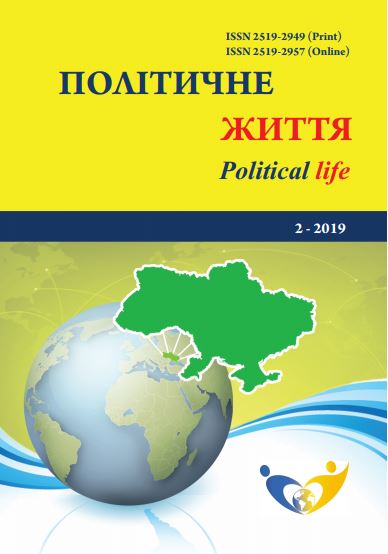Children-combatants in the post-coflict period: the problem of liability and protection of child rights (international experience for Ukraine).
DOI:
https://doi.org/10.31558/2519-2949.2019.2.2Keywords:
child soldiers, children-combatants, a child who has suffered as a result of hostilities and armed conflict, the rights of the childAbstract
The use of children as participants in armed conflicts is the worst manifestation of dehumanization, when there is a violation of the inalienable human rights of the most vulnerable members of society – children. This problem is not exclusively legal, although it is fully regulated by international humanitarian law. It extends to the sphere of morality and actualizes the question of the reproduction of society, since children-combatants, having experienced devastating influence on their own personality in the process of its formation, experiencing post-traumatic stress disorder, even receiving special assistance then, in the future, unlikely to be able to develop into a full-fledged personality. The problem of child combatants is especially relevant for the African continent, but unfortunately our state, since 2014, also contributes to this cumbersome statistics. There is no thorough, full-fledged study of the level of involvement of juvenile and minor children in the armed conflict in the East of Ukraine. This is primarily due to the fact that, as part of the regular units of the Ukrainian Army operating on the basis of domestic and international law, there are no and there can be no young people under the age of 18, at the same time, the study of the number of combatants in separatist armed groups , Russian paramilitary groups and parts of the regular army of the Russian Federation, which invaded our state, for obvious reasons, is complicated. The purpose of this article is to analyze the foreign experience of creating a system of normative regulation and measures of social work for legal and psychosocial rehabilitation of children-combatants. The current foreign experience of establishing a system of normative regulation and social work activities for the legal and psychosocial rehabilitation of child combatants is valuable for Ukraine both in terms of using achievements and in the context of avoiding negative consequences. Firstly, it is important to emphasize the need for careful study in the judicial process of the reasons for involving the child in participation in an armed conflict, the subjects of such involvement, ascertaining the concrete actions that were committed and the child, and in relation to the child with their respective legal qualifications. . Secondly, if a decision is made on measures to punish children-combatants, they should be mainly the nature of probation with compulsory long-term psychosocial rehabilitation. Thirdly, it is extremely important to determine the responsibility of parents of child soldiers for improper performance of parental responsibilities, in the event that they had an objective opportunity not to leave the child in territories not under the control of the Ukrainian government.References
Про охорону дитинства: Закон України вiд 26.04.2001 № 2402-III. URL: https://zakon.rada.gov.ua/laws/show/2402-14. (дата звернення: 29.03.2019).
Порядок надання статусу дитини, яка постраждала внаслідок воєнних дій та збройних конфліктів: затверджений постановою Кабінету Міністрів України від 5.04.2017 р. № 268. URL: https://zakon.rada.gov.ua/laws/show/268-2017-п. (дата звернення: 29.03.2019).
Дополнительный протокол к Женевским конвенциям от 12 августа 1949 г., касающийся защиты жертв международных вооруженных конфликтов (Протокол I). Женева, 8.06.1977 г. URL: https://www.icrc.org/ru/doc/assets/files/2013/ap_i_rus.pdf. (дата звернення: 29.03.2019).
Дополнительный протокол к Женевским конвенциям от 12 августа 1949 г., касающийся защиты жертв вооруженных конфликтов немеждународного характера (Протокол II). Женева, 8.06.1977 г. URL: https://www.icrc.org/ru/doc/resources/documents/misc/6lkb3l.htm. (дата звернення: 29.03.2019).
Конвенция о правах ребенка. Принята резолюцией 44/25 Генеральной Ассамблеи от 20.11.1989 г. URL: https://www.un.org/ru/documents/decl_conv/conventions/childcon.shtml. (дата звернення: 29.03.2019).
Факультативный протокол к Конвенции о правах ребенка, касающийся участия детей в вооруженных конфликтах Принят резолюцией 54/263 Генеральной Ассамблеи от 25.05.2000 г. URL: https://www.un.org/ru/documents/decl_conv/conventions/rightschild_protocol1.shtml. (дата звернення: 29.03.2019).
Арзуманян Н., Пиццутелли Ф. Жертвы и палачи: вопросы ответственности, связанные с проблемой детей-солдат в Африке. Международный Журнал Красного Креста. 2003. № 852. С.429-462.
Будете плакати – вб’ємо: діти, завербовані в солдати, згадують про пережиті звірства. URL: https://trueua.info/news/budete-plakati--vbyemo-diti-zaverbovani-v-soldati-zgaduyut-pro-perezhiti-zvirstva. (дата звернення: 29.03.2019).
Бывшие угандийские дети-комбатанты опять идут в армию, но уже в правительственную. URL: https://news.un.org/ru/story/2005/02/1065941. (дата звернення: 29.03.2019).
Галанцев В. Хто він, малюк з «калашем»? Військо України. 2004. №9-10. С.23-25.
Дутли М.Т. Дети-комбатанты, захваченные в плен. Дети и война: сб. статей. Москва: МККК, 1995. С.64-80.
Платтнер Д. Защита детей в международном гуманитарном праве. Дети и война: сб. статей. Москва: МККК, 1995. С.5-20.
Правозахисники зафіксували 95 випадків, коли дітей залучали до збройного конфлікту на Донбасі. URL: https://forbiddentoforbid.org.ua/uk/pravozakhisniki-zafiksuvali-95-vipadki/. (дата звернення: 29.03.2019).
Френкель М. Гражданская война в Либерии. Международная экономика и международные отношения. 1998. № 7. С. 102-109.
Kumar K. Civil War, Women and Gender Relations: An Overview. Woman and civil war: Impact, Organisation and action. London: Boulder, 2001. Р. 5-79.
UNICEF. A major step to end the use of child soldiers. URL:www.unicef.org/noteworthy/protocol-conflict/. (дата звернення: 29.03.2019).

